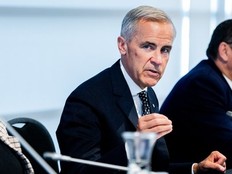GOLDSTEIN: Carney ducks confronting Trump on steel tariffs

Article content
It was elbows down once again for Prime Minster Mark Carney on Wednesday as he announced new measures to support Canada’s beleaguered steel industry in the face of President Donald Trump’s 50% tariff on Canadian steel imports into the U.S.
Despite the fact Trump doubled the tariff on Canadian steel to 50% in June, up from 25% in March, Carney did not respond in kind, instead keeping Canada’s counter-tariff on U.S steel at the 25% level he announced in March.
When Trump doubled the tariff on Canadian steel to 50% in June, Carney said his decision on whether to raise Canada’s tariff on U.S. steel to 50% would depend on the outcome of the ongoing trade negotiations which at the time had a deadline of July 21, now extended to Aug. 1.
On Wednesday, while Carney toughened existing tariff rate quotas (TRQs) that allow foreign steel to come into Canada at reduced or tariff-free rates before tariffs apply, he excluded U.S. steel imports.
As the federal government put it:
“Effective Aug. 1, 2025, the TRQs will be extended to countries that have a free trade agreement in force with Canada, with the exception of the United States and Mexico.”
Carney also excluded the U.S. from what are known as melt and pour tariffs — a 25% surtax to be “applied on imports from all countries other than the U.S. that contain steel melted and poured in China.”
So basically, in response to Trump’s imposition of a 50% tariff on Canadian steel in June, Carney on Wednesday announced tougher restrictions on foreign steel imported into Canada from China and other countries in order to reduce dumping — but avoided a direct confrontation with Trump on U.S. steel imports into Canada.
The rest of Carney’s announcement on support for Canada’s steel industry was monetary:
– $70 million over three years to support and retrain up to 10,000 steel workers laid off as a result of Trump’s tariffs
– up to $150 million earmarked for Canada’s regional development agencies to support Canadian steel industries impacted by U.S. tariffs
– up to $1 billion allocated through a strategic innovation fund to support the steel industry’s transition toward new lines of business and to strengthen domestic supply chains.
– loosening the qualifications for steel and other large companies to access a $10-billion large enterprise tariff loan program to support Canadian companies affected by actual or potential U.S. tariffs and Canadian countermeasures.
Carney’s continuing reluctance to hit the U.S. with dollar-for-dollar counter-tariffs, which he supported while running for the Liberal leadership but abandoned after becoming prime minister, is based on two factors.
First, Canadian counter-tariffs on U.S. products imported into Canada raise the cost of living for Canadians.
Second, Canada can not win a dollar-for-dollar tariff war with the U.S. given that its economy is 10 times the size of ours.
In that sense, Carney’s announcements on Wednesday to support the Canadian steel industry make sense but his problem is that they run counter to his “elbows up” rhetoric during the election.
While we don’t know the contents of the deal Carney is attempting to negotiate with Trump — other than that whatever is in it at this point hasn’t satisfied him — it appears, publicly, at least, that so far Canada has been making all the concessions (for example scrapping the Digital Services Tax simply because Trump demanded it) without getting much in return.













Postmedia is committed to maintaining a lively but civil forum for discussion. Please keep comments relevant and respectful. Comments may take up to an hour to appear on the site. You will receive an email if there is a reply to your comment, an update to a thread you follow or if a user you follow comments. Visit our Community Guidelines for more information.